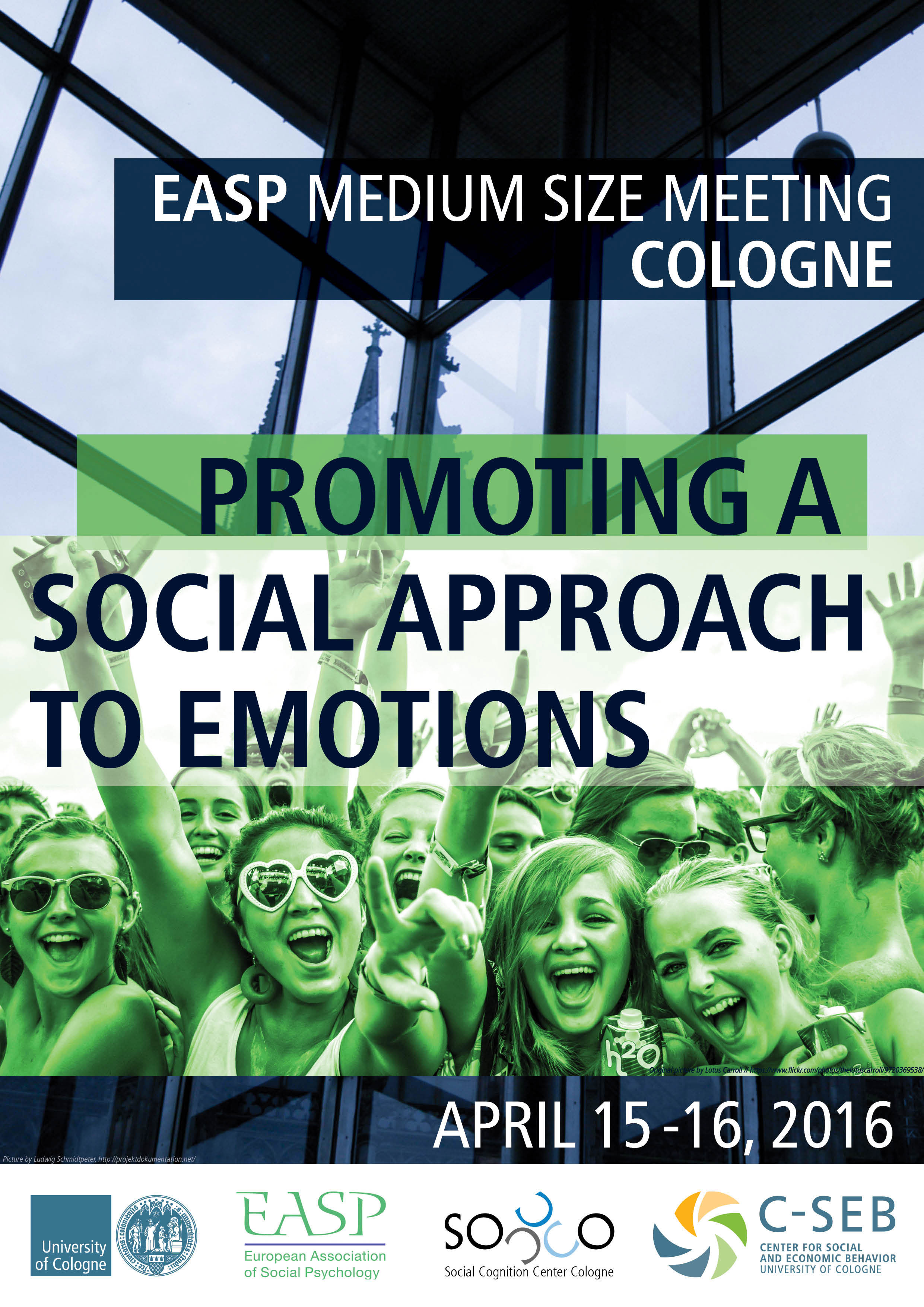Report on EASP Medium Size Meeting „Promoting a Social Approach to Emotions“
10.05.2016, by Sibylle Classen in meeting report
Jens Lange (University of Cologne), Jan Crusius (University of Cologne), Gerben Van Kleef (University of Amsterdam)
15th/16th April, 2016, Cologne, Germany

We were very happy to welcome an amazing crowd of psychologists covering all career stages to our meeting “Promoting a Social Approach to Emotions” in Cologne, April 15 to 16. Initially, we had 75 applications for what was planned to be a Small Group Meeting. Supporting our efforts to accommodate as many of all the excellent contributions as possible, the EASP kindly agreed to increase our meeting to Medium Size. This allowed us to accept 42 participants overall, although admittedly still a tough decision process for us.
The meeting brought together various colleagues interested in emotions with the aim of sharing and discussing research that promotes a social approach to investigating emotions. PhD students, PostDocs, and Professors alike presented their ongoing research projects, theories, and ideas for future research in a multitude of insightful talks, blitz talks, and posters. Friday started off with a session on the “Expression and Suppression of Emotions” with talks by Elise Kalokerinos, Katharine Greenaway, and Andrea Paulhus on the context sensitivity of positive emotions and signals of facial expressions. Afterwards, Vincent Yzerbyt, Toon Kuppens, and Ruthie Pliskin presented their research on “Group-based emotions” with an emphasis on their emergence, definition, and application to intergroup conflicts. Subsequently, researchers on a more advanced career level teamed up with junior researchers for pre-arranged junior-senior meetings. The nice weather provided the excellent conditions to go for a walk and discuss challenging and inspiring questions in an informal setting. The afternoon started with a session on “Social Approaches to Envy and Schadenfreude” including talks by Niels Van de Ven, Jens Lange, and Jan Crusius on the social functions of envy and schadenfreude in general and their role in narcissists’ popularity in particular. In the evening, Alexa Weiss, Arik Cheshin, Janis Zickfeld, Julia Sasse, Katerina Petkanopoulou, Laura Sels, Lea Boecker, Lisa Blatz, Mark Carew, Paton Yam, Stine Torp Løkkeberg, Tom Kupfer, Victoria Schönfeld, and Xia Fang presented posters on various topics including distrust, beliefs about emotions, partner-expected affect, the effect of unpleasant information on motivation, and smiling as well as specific research on kama muta, anger, social comparison-based emotions, admiration, envy, embarrassment, schadenfreude, disgust, and empathy. Saturday began with a session on “Interpersonal Processes in Emotion Perception” with talks by Brian Parkinson, Ursula Hess, and Gerben Van Kleef on interpersonal effects of emotions, their malleability, and their persuasive power. Afterwards, Agneta Fischer, Nicolay Gausel, and Michael Boiger presented their research and ideas on shame, guilt, and anger in a session on “Self-conscious Emotions”. After lunch, Eleanor Miles, Frieder Paulus, Friederike Funk, Ines Schindler, Magdalena Rychlowska, Lisanne Pauw, Pum Kommattam, and Yossi Hasson engaged the audience with their blitz talks on the effectiveness of emotion suppression, the effect of emotions in resource dilemmas, and interpersonal emotional regulation as well as specific presentations on embarrassment, remorse, self-transcendent emotions, and empathy. Subsequently, in the session on “Intrapersonal Processes in Social Effects of Emotions”, Michael Häfner, Lisa Feldman-Barrett, and Shlomo Hareli discussed the roles of interpersonal distance, social learning, and emotional counter-reactions in the elicitation and understanding of emotions. Finally, Alan Fiske and Thomas Schubert outlined their new approach to being moved by love, namely “Kama Muta”, bringing the audience to tears. Overall, the quality and depth of all contributions was fascinating and thought-provoking. In fact, we as organizers would also propose a new emotion referring to being moved by academic excellence, maybe called PaSAtE in relation to our meeting.
In addition to scientific excellence, we enjoyed having lunch together on both days right at the conference venue, located at the heart of the university campus. As another highlight, we had the possibility to serve outstanding cake from the best craftsman of Cologne in 2015—Zimmermann (founded in 1875!)—on Friday and from a fancy local bakery—TörtchenTörtchen (founded in 2005!)—on Saturday. Several participants mentioned that the cake will linger in their memory, hopefully not overriding the scientific contributions, though. Furthermore, on Friday evening we went to one of Colognes famous breweries to indulge into yummy (albeit nutritionally challenged) local food and organic Kölsch. Finally, on Saturday evening, the University of Cologne Bus took us to the restaurant Bagatelle where we could share French tapas and wine to celebrate the social nature of our meeting.
Importantly, the smooth flow of events and detailed organization of the meeting was made possible by our amazing local organizing team, most notably Eileen Pauels and Jennifer Mayer in concert with Julia Pauquet, Andrea Przegendza, and Nora Schumacher. They literally invested blood, sweat, and tears (just a minor accident, nothing serious!) to create the casual atmosphere and provide all the necessary means to turn this into the meeting that we as organizers enjoyed so much and felt honored to host.
For more information, please visit our website http://soccco.uni-koeln.de/easp-sgm-2016.html. Next to the EASP, we also want to thank the University of Cologne and its competence field “Social and Economic Behavior” with the Center for Social and Economic Behavior (C-SEB) for their financial support.